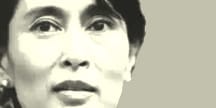A commentary by Hozan Alan Senauke, celebrating Aung San Suu Kyi’s win in the Burmese parliament.
 The good news from Burma kept coming in yesterday, after regional by-elections there in 45 districts. It was not an April Fools joke. According to the Mizzima news service, Aung San Suu Kyi’s National League for Democracy looks to have won 44 of the 45 contested seats in the Burmese parliament. Official results will be released later this week.
The good news from Burma kept coming in yesterday, after regional by-elections there in 45 districts. It was not an April Fools joke. According to the Mizzima news service, Aung San Suu Kyi’s National League for Democracy looks to have won 44 of the 45 contested seats in the Burmese parliament. Official results will be released later this week.
A former political prisoner said to me this morning: “I am glad for my people, who were peacefully able to let the world know that they didn’t want the (junta’s) government.”
A western friend outside NLD headquarters in Yangon wrote: “People are genuinely happy here and I’ll never forget the sound of people cheering in the streets when the results were shown on the screen at the headquarters. It’s a beautiful moment here and I hope it lasts.”
This last sentiment — “I hope it lasts” — is the point on which everyone is holding their breath. The NLD and democracy forces won a landslide electoral victory in May of 1990, only to find the results systematically ignored and many of the winning candidates not just blocked from taking office, but arrested and imprisoned, some of them for years.
The military still holds the balance of power. The 2008 Burmese constitution guarantees a quarter of the 664 parliamentary seats to the military. And a large number of the elected civilian representatives are themselves former officers or direct supporters of the former junta. This apparent NLD victory at best adds up to less than 7% of the parliament.
Even yesterday, a leading Saffron Revolution monks wrote: “For a free and fair election to take place, the international community must ensure that Burmese government respects the Rule of Law. Without the Rule of Law, there can be no justice; nor can there be a free election that leads to a democratic country.”
He is, of course, correct. Just a quick read of the new constitution confirms the absence of due process and the military’s enduring grasp of the reins of power. There is still active fighting in Burma’s remote Kachin state, with more than 75,000 internally displaced people in desperate need of food and shelter. Despite significant prisoner releases in late 2011 and January 2012, two weeks ago a Burmese human rights organization presented U.S. Special Envoy Derek Mitchell with a list of 619 political prisoners still behind bars in prisons scattered throughout the country.
So we celebrate and we watch. The new day’s light is brighter with this election. This is a cause for joy. It is also incentive for those who love Burma — inside and outside the country — to encourage President Thein Sein and the government to stay on the path of real reform, and not slide back into the shadows.

Hope and fear largely constitute all the emotions. Hope and fear represent the kind of pushing and pulling quality of duality, and all the emotions consist of that. Emotions are different aspects of that duality: they all seem to be made out of hope and fear of something—either pulling and magnetizing, or fending off.
Fear contains insight as well as the panicky blind quality we often associate with it. The element of panic has a deaf and dumb quality—you know: doing the best you can, in spite of your fear, hoping everything will be okay. But fear without hope seems to be something very insightful. If you give up your hope of attaining something, then tuning into fear is tuning into its insightful quality. Then, skillful means or action arises spontaneously out of the fear itself. Fear can be extremely resourceful rather than representing hopelessness. It is the opposite of hopelessness, in fact.
– Chogyam Trungpa Rinpoche